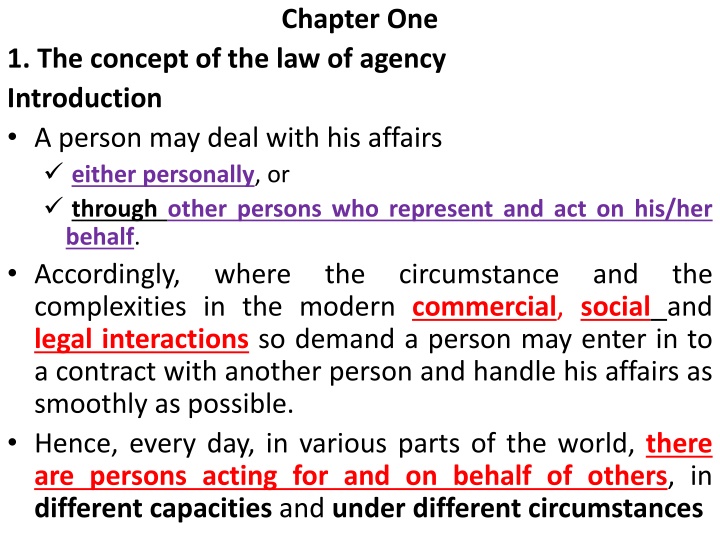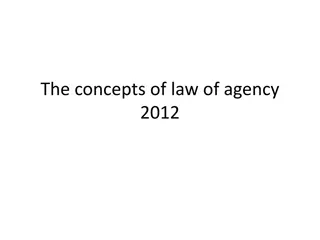
Law of Agency in Modern Legal Systems
Learn about the concept of the law of agency, where individuals can appoint representatives to act on their behalf in various legal, social, and commercial interactions. Explore the roles of agents and principals, the importance of agency in daily life, and the definitions associated with this fundamental institution.
Download Presentation

Please find below an Image/Link to download the presentation.
The content on the website is provided AS IS for your information and personal use only. It may not be sold, licensed, or shared on other websites without obtaining consent from the author. If you encounter any issues during the download, it is possible that the publisher has removed the file from their server.
You are allowed to download the files provided on this website for personal or commercial use, subject to the condition that they are used lawfully. All files are the property of their respective owners.
The content on the website is provided AS IS for your information and personal use only. It may not be sold, licensed, or shared on other websites without obtaining consent from the author.
E N D
Presentation Transcript
Chapter One 1. The concept of the law of agency Introduction A person may deal with his affairs either personally, or through other persons who represent and act on his/her behalf. Accordingly, where the complexities in the modern commercial, social and legal interactions so demand a person may enter in to a contract with another person and handle his affairs as smoothly as possible. Hence, every day, in various parts of the world, there are persons acting for and on behalf of others, in different capacities and under different circumstances circumstance and the
Therefore, agency is a very important institution applicable in almost all areas of law.. Given its growing importance, it can be said that, agency is not an alternative component in the daily life of persons Teaching material; The concept of Agency is recognized in all modern legal systems as an indispensable part of the existing social order. but essential
An agent is appointed when an individual is unable to act himself on account of; his manifold occupations, absence, illness, advanced age, etc; or A representative may be designated in order to take advantage of his; special capacity, knowledge, and experience Or even for the mere desire, such as not to appear personally in order to avoid hostility, controversy, etc
Definition Agent an agent is one who is authorized to act for or in place of another; or is a representative who normally binds not himself but the person he represented (the principal) by the agreement he enters in to with the latter (Black s law dictionary) An agent is a person who has agreed to act on the principal s behalf and subject to the principal s control Principal Is the one who confers authority to an agent to be represented and to be liable for the acts of the agent
Agency; There is not yet a comprehensive definition provided for the concept agency . However, there are different attempts put forward so far. In the Oxford Companion Law, the term agency is defined as: The relationship between one person, the agent, having authority to act, and having consented to act on behalf of another, the principal, in contractual relations with a third party. Simply put, agency can be defined as; a relationship between two persons, where one (the agent) may act on behalf of the other (principal) and bind the principal by words and actions.
The Nigerian supreme court once stated that In law the word agency is used to connote the relationship which exists when one person has an authority or capacity to create legal relations between a person occupying the position of principal and third party, and the relation also arises when one person called the agent has the authority to act on behalf of another called the principal and consents (expressly or by implication) so to act . What can you explanation??? discern from this
Alternatively; Law of agency relates to the authority to act on behalf of others or the authority to enter in to juridical act/s on behalf of other persons Take a look at Article 2199 of the civil code Agency is a contract whereby a person, the agent, agrees with another person, the principal, to represent him and to perform on his behalf one or several legally binding acts. What elements can you pinpoint from the article????
Vol.1; / p.43 / ( ); ( / / 2198)
Generally, There may be many instances in which a person represents or acts for or on behalf of another. But the true law of agency applies only when the act of the presumed agent produces legal consequence the agency r/ship must be performed in such a way as to be able to affect the principal s legal position with respect to strangers to the relationship)
the law of agency does not apply to social or other non-legal situations for example, owhen a man sends his wife or son to represent him at a wedding, launching, or naming ceremony, But, for example in Sale contract (agent) is given authority to act on behalf of P ( principal) and A sale a motorcycle to T (THIRD PARTY) the contract is enforceable b/n P and T A has no liability to either P or T on that contract. if A
Significance/why the law of agency From the point of view of juridical personality; Juridical persons, though they are holders of rights and bear obligation, they do not have physical existence. Rather, they are run by human persons who represent the interest of the fictitious persons. Art. 216 of the commercial code; 1) A business organization shall acquire rights and incur liabilities by its agents in accordance with the provisions relating to agency. 2) A business organization proceedings by its agents. shall act in legal
From the point of view of business demand; Physical inconvenience - Though individuals may have to involve themselves in different business and other transactions, because of Spatial(space), cultural, language, or other limitations, they could not manage to undertake each and every activity by themselves; this in turn brings forth the need to be represented. It is essential for effectiveness and efficiency by reducing the cost of handling business.
Professional inconvenience - This point is also related to overcoming limitations attached with knowledge and skill. Vol.1; / / ); p.43 / / / / 57 (
Acts which cannot be performed by an agent; Though a person, in principle, can undertake business through an agent, exceptionally, there are acts which are so personal to the doer and can t be handled by an agent; Will Art. 857 - Strictly personal nature. A will is an act which is strictly personal to the deceased. agreement whereby a person grants to another person the power to make, modify or revoke a will on his behalf shall be of no effect. A person may not entrust a third person with the task of determining how and on whom his succession is to devolve.
Donation Art. 2434 - Personal nature of donation. (1) A donation is an act purely personal to the donor. (2) The authority given to make a donation shall be of no effect unless it specifies the property to be donated and the donee. Exceptionally, according to Art.2434 (2) of the civil code, if the donee and the property to be donated are specified, donation can be made by an agent who is so authorized
Marriage RFC - Article 12 - Representation not allowed. Each of the future spouses shall personally be present and consent to the marriage at the time and place of its celebration. Notwithstanding the provisions of Sub-Art. (1) of this Article, marriage by representation may be allowed by the Ministry of Justice where it has ascertained that there is a serious cause and the person who intended to do so has fully consented thereto.
Genesis and Development of the Law of Agency The concept of agency representation in the sense it is understood now is said to be emerged around the 12thc (A.D) along with the salve and slave owner s relations. Since slaves were considered as a mere chattel without any rights; it was logical to hold the owner legally liable for the acts of his slave, especially if the acts of the slave were done based on the direction of the slave owner. The concept of agency developed independently in the civil and common law legal systems. However, the rudimentary representation as it is understood today became visible in both legal systems around the end of the twelve- century and early thirteen centuries rules of agency
The Roman law In ancient Roman law, for a contract to exist between two persons, both of them should be personally and physically present. Reason: The Roman conception of the personal nature of obligation rights and liabilities were acquired or incurred only by the persons making the contract; third parties are not considered. ceremonial nature of contracts Patriarchal economy of the Romans. This economy was least developed, and almost all business transactions were limited within the family. Hence it is possible to infer that there was no need for the institution of agency.
Hence, In spite of its high development, the Roman law did not outgrow an overall theory of agency in their law of contract, and even it was utterly unknown in the early law of contracts and never in the entire history of the Roman law did it reach the importance it has attained in the English law. Common law It is believed that agency was not part of the common law until the 13thC. But around the end of the 12thC and beginning of the 13thC, owing to the emergence of master and servant relationships, the concept brought in to the system.
Three main standards gave rise to the effective development: The emergence of the class of attorneys in legal matters. The impact of cannon (laws of the Christian church) law: and Custom of merchants, which at that time was already engaged in lively trade in Europe, created the introduction of some concepts of agency. Accordingly, the common law recognized that when contracts are made by an agent on behalf of his principal, it was to be held that the principal and not the agent was liable; not only when the agent had express authority to do the particular acts, but also when he acted within the scope of an authority to do acts of a particular kind
Civil law The concept of agency started to develop in the Roman law, however, in the 15th and 16thC and slowly had to recognize the activities of agents. Accordingly, at a certain point, historical development of the Roman s the agency concept, holding masters liable for acts of their slaves or agents was observed. in the
Ethiopia It has been said that, even prior to the adaption of the Fetha Negest around the 16thC; the Roman law of Justinian influenced the Ethiopian legal System in earliest stage because, around the 6thC AD, Ethiopia had a permanent communication with Emperor Justinian who was the emperor of the Roman Empire then whose codes influenced the formation and development of modern private laws in many countries of the world. Fewese Menfesawi This is the first known code of law prepared during the reign of Emperor Zaraya Yacob in the middle of 15thC. Was essentially a religious document. When the emperor heard about a document of superior quality in Egypt, order for translation Fetha Negest
The Fetha Negest Brought to Ethiopia in the middle of 15thC during the reign of Emperor Zarayacob. ACoptic Church scholar named Ibn Al Assal said to have created the document in the 13thC compiling the principles of Christianity, Byzantine legal tradition and Islamic commercial law. Translated in to Geez by a church scholar (named Abda Sayd s son) from the Egyptian Arabic version in the 15thC. Has both religious and secular parts
The concept of Agency under the Fetha Negest; Chapter XXX (30), Mandate (on Proxy/ assigning authority) Provides rules governing the relationship of mandatory (principal) and mandatary (agent). Some important stipulations worth consideration; Who can be an agent? Anyone who adheres in every respect to the rules regarding his soul and to the laws is worthy of being appointed as mandatary. Scope of mandate - A mandate may extend to all affairs and judgments or with respect to specific objects, to the exclusion of others.
Nature of the mandate The mandatary accepts the mandate with or without remuneration. Form of mandate Amandate is not valid unless the mandatory gives it verbally and the mandatary accepts the word either formally or by his actions. There were stipulations regarding; Source of Authorities and duties of the mandatary Proof of authority Extinction of authority Revocation of authority Conflict of interest Effect of fraudulent contract with the family of the mandatory Mandatary for jointly owned property Delegation of authority to another person
according to the Fetha Negest, the contract of mandate had only to say with regard to the internal relation of the mandate giver and the mandate receiver (mandatory or agent). Hence the external relations i.e the relation of the mandatary or mandatory with a third party was not given a cover. After the Fetha Negest and before the 1950 s and 1960 s codification, particularly in the 1920 s, early 1930 s and 1940 s Ethiopia passed several statutes; such as company law, loan law, bankruptcy law, business registration law and banking law. However, it is not stated whether this laws have dealt with agency matters.
Shortly decision rendered in the case of Costace V. Forteye, Try to explain its relevance with regard to the development of law of agency summarize the facts and
Session two Sources of agency What are the sources authority? From where does the agent derive his authority? Read art. 2179 of the civil code? What do we mean by authority? Authority-; the right to exercise powers an ability to execute juridical acts in the name and on behalf of the principal
Art 2179; The authority to act on behalf of another may derive from the law or a contract. Accordingly, while agency relationship predominantly results from contract, in some cases it arises from the law. What source do you think is lacking from this definition???? Agency emanating from law When agency arises from the law, it is the law which governs the agency. the consent of the principal has no role in creating the agency relationship
This usually happens where ; a person to be represented is not in a poison to appoint his agent for one thing or another. due to the necessity to safeguard the interest of the person to be represented Hence, there is already a single contract, The external contract the internal relationship is legal and not contractual However, the external contract is governed by the provisions pertaining to agency
Eg. 1. Minors What do you remember about tutor and guardian??? o Read Art 199 guardian- upbringing Tutor-pecuniary matters o 280 of the civil code; The tutor shall represent the minor in all civil matters. Art.269 of the RFC; 1) The minor shall be represented by his tutor concerning his property and his pecuniary interests. 2) The tutor shall take utmost care concerning the pecuniary interests of the minor and the administration of his property
Art. 305 of the RFC; Acts performed by the tutor, on behalf of the minor, shall be binding on the minor as though he had performed them himself being a major. They shall not be binding on the tutor personally, save an explicit undertaking on his part or in cases provided by law In this case, without the need to secure the consent of the principal or authorization, agent-principal relationship existence. comes into
2. Business organizations; example ordinary partnership Art. 236; All the partners shall have a right to act as managers, unless one or more of the partners or a third party [is appointed]. Art.241. rights and duties of managers The provisions relating to agency shall apply to rights and duties of managers.
General partnership; Art. 287 - Administration of partnership. (1) The partnership shall be administered by one or more managers who may or may not be partners. (2) Where no manager is appointed, each partner shall be a manager. Art. 289. Scope of duties of managers (1) Managers may, in accordance with the law, act for and. bind their firm. Limited partnership; Art.300 have the same rights and obligations as partners in general partnership. Share company see Art. 363 of commercial code Private limited company - Art. 525ff of commercial code
Agency emanating from judicial decision; This is not an agency either by a prior agreement or by operation of the law; but arises from the order of the court upon application. Take a look at Arts. 2253-2256?????? Who are the Parties? Read, Art.2253; The authority to do an act or acts of a certain kind on behalf of another may be given by the court to a person hereinafter called the curator. the curator and the person to be represented Who can apply to be a curator??- see art. 2254 What requirements need to be fulfilled? See art. 2255
What are the obligation of a curator? see art. 2255 to carry out acts as are of Urgent nature What do you think are this acts? Read art. 2256(1) and (2)- informing the represented Right and obligation as stated under 2199-2233 of the civil code Contentious issues As the heading of Chapter 4 shows it is authority granted by the court. But, as Art. 2179 shows authority may arise from the law or a contract. So, can we say that, strictly speaking it is the third type of authority granted by judicial decision?
Two different views Proponents i. the person represented won t be required to give his consent (Art. 2256 (1)), ii. It is the court which is appointing the agent for conditions specified upon the application of the parties stated therein and that iii. ascertaining these elements is up to the court, it is a third source of agency by virtue of judicial decision. iv. They buttress their argument based on Art. 2256 (2) which makes cross reference to the application of chapter 2 provisions in case of agency emanating from judicial decisions
Counter argument i. since Art. 2179 specified the two possible source of agency, Art. 2253 and following provisions can be emanating from law. ii. It is even the law which is defining the relationship and therefore, the authority emanates from the law. Which side of argument do you support? Why/why not???? taken as agency
Contractual Agency Is the basic /most common sources of agency Its purpose is to give authority for an agent so that he can perform juridical acts with third parties. Thus, there are three parties which comes in to picture Art. 2199 and the following provisions govern agency emanating from contract. In view of that, Read Art. 2199- the definition
Is it inclusive of both the internal and external contract? The parties to the contract are: principal and agent it also seems that it more capitalize the obligation of the agent than the obligations of the principal. This doesn t mean that the principal owes no obligation see Art.2219 The emphasis signifies the fact that in contractual agency, though there are two contracts, the internal contract is the basis for the external.
Contract of agency is a special form of contract. As such, the provisions of the general contract law are still applicable where the matter is not specifically regulated under the law of agency. Thus, the validity requirements for the formation of contract under the general contract provisions (Art. 1678 cc), need to be consulted
Requirements Art. 1678 cc i. Capacity; See.Art. 1678 Literal meaning- The ability to do something Legally- competence to enter into a legally binding agreement. Consider the following quotaion. What do you think? NEMO POTEST FACERE QUOD PER SE NON POTEST which means that no one can do through another what he cannot do himself . what he has no power to do personally he cannot acquire power to do by doing it through another. PER ALIUM,
Should a principal possess a legal capacity? consider the following statements from the TM; A principal can only which he is capable to perform himself. He cannot extend his legal capacity by acting via an agent. Therefore a minor can appoint an agent only for the specific acts, which he is capable under the law to perform personally. The capacity of the principal is element of the contract. What about a third party? The same is true. What about an agent? delegate transactions, an essential
The problem lies with regard to the capacity of the minor? What do you think?? Remember your discussion on the law of contract Art. 192 and the ff Capacity is presumed but might be restricted by the law General disability -:age, mental condition and sentence passed) special disability (foreigners)
Minor- Art. 198- less than 18 years and Art. 199- a minor may not perform juridical acts except allowed by the law.. See for example, art. 228, 272, 273 and 308 So can a minor be an agent of someone???? Provisions related with agency law provide nothing So it is a contentious issue Can a principal appoint a minor agent? Why/why not? Generally there are arguments for and against
Argument for Any person, though without power to contract in his own right may act as an agent for another the agent does not bind himself but acts as a mere intermediary The capacity of an agent is a matter of indifference with respect to the main contract They stateArt. 2189- complete agency/disclosed agency The agent should act in the name of the principal The agent has to act within the scope of his power. In such cases the contract is deemed to have been made by the principal --so the agent steps out of the contract
Therefore, in case of complete agency, the agent is said to be not party to the contract non-existent in the eyes of the law. Thus, they argued that the principal has every right to appoint as an agent an incapable person. If the former is confident enough in the honest and intellectual capacity person. And this is owing to the fact that his agent is not responsible for the acts he performs in the name of the principal. of the incapable
Conceptually, most jurists agree that since the agent is out of picture, incapacity of the agent won t affect the external contract. . See Arts. 2197 and 2198 of the cc for undisclosed agency where the agent acts in his own name but on behalf of the principal.
Argument against Art. 1678(1) ,199(3), ReadArt. 2182(1) cum.Art. 2230, it states that, unless there is otherwise agreement, incapacity of the agent is one of the grounds for the termination of the contract of agency. Thus, a principal can not appoint a minor to be his agent who is precluded from making a juridical act and even the law of agency it self stipulates that incapacity (minority) terminates the agency relationship.
But those who argue in favor of the first argument again respond that Both art. 2182 and 2230 state ``unless otherwise agreed Thus, where the contract of agency is concluded knowing that the agent is incapable, it can be taken as an otherwise agreement and thus, won t have effect on the external contract. These articles also refers only to an agent who had capacity at the time of authorization but declared incapable at a latter time to construe the stated article, as it requires the agent s legal capacity may be inconsistent with the intention of the drafter of the civil code






















